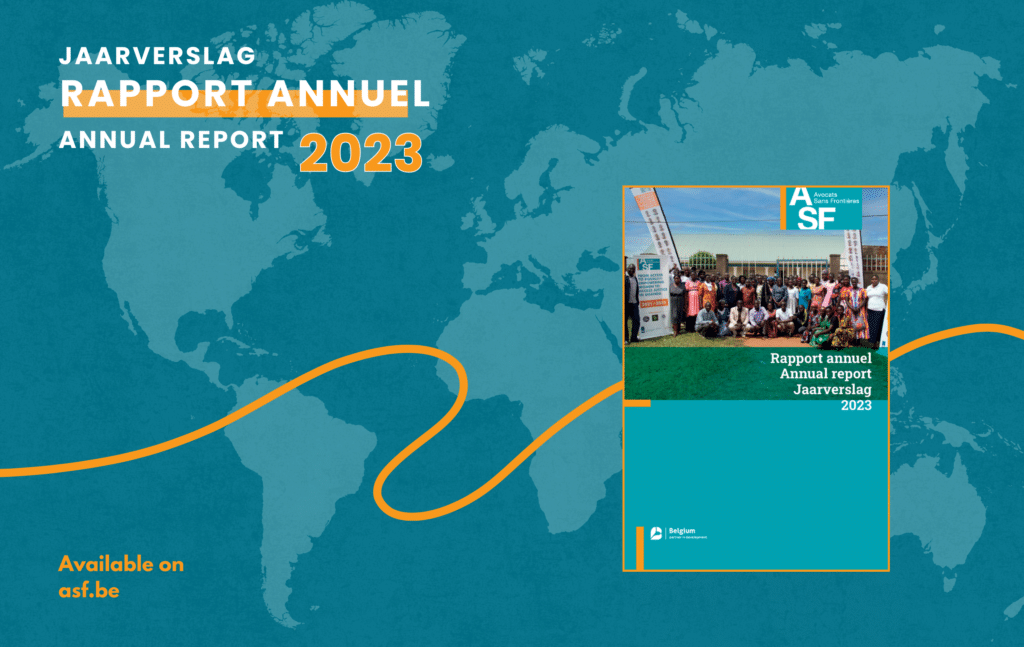
ASF has just published its 2023 annual report. In it, the organisation discusses the many challenges it faces at a time when authoritarianism is on the rise and the principles of human rights and the rule of law are being attacked throughout the world.
In the face of these challenges, ASF is adapting and adapting its approaches to continue to deploy impactful and sustainable actions in favour of human rights. All this (and more) is covered in the pages of this report.
We hope you enjoy reading it!
Editorial by Chantal van Cutsem, ASF’s General Director
Dear readers,
Summarising ASF’s action in 2023 in a few sentences is quiet the challenge, given how intense and rich this year was for the organisation.
Our development in news countries (Niger, Kenya and Tanzania) is pursuing while the recently launched regional offices in Kampala (East Africa) and Tunis (Euro-Mediterranean) are nom implementing their own projects.
This year has also brought its share of challenges and concerns. Around the world, we are witnessing a rise in authoritarianism and a attacks on the principles of democracy, the rule of law and human rights.
Civic space and counter-powers are under attack, activists are threatened, intimidated or arrested, governments no longer respect court rulings, population groups are targeted and marginalised, etc.
In this context, the protection of civic space and the defence of human rights defenders are more than ever at the centre of all our reflections.
Every page of this report is a tribute to all those who suffer pressure and harassment, who risk their freedom, and sometimes their lives, because of their commitment to social justice and fundamental rights.
Our thoughts are with the leaders of two partner associations in Burundi, who were arrested and detained for many months. Their commitment exposed them to arrest, detention and exile, yet it has not wavered.
In Niger, where we launched our first activities in support of civil society, our teams proved resilient in the face of the shock of the military coup in July 2023.
In Tunisia, the authorities are attacking civil society and its legitimacy. The government is pursuing racist and xenophobic policies, backed and encouraged by the policies of the European Union and its member states on migration, which expose sub-Saharan migrants to countless violations of their rights and criminalise the action of those working to defend them.
In Uganda, the adoption of an anti-LGBTQI+ law constitues an attack on the rights of sexual and gender minorities and the civil society organisations that represent them.
These trends, these realities, are forcing us to adapt our actions and our positions. They are driving us to work together with our partners to gather the vital forces in civil society to take effective action against the rise of authoritarianism and state violence.
They lead us to develeop approaches that are always more collaborative, and to work to bring together all who contribute to the fight for social justice, fundamental rights and the rule of law.
Those coaltions and networks enable ASF to support more and more citizens so that they can assert their rights and demand accountability from their decision-makers.
To hold decision-makers accountable, ASF works with communities of practice to initiate strategic litigation before national and regional courts and tribunals.
In Africa and Europe, we are developing new projects with a wide range of stakeholders: national and international partners, academics, students, legal professionals, civil society organisations, etc. Through our Justice ExPEErience network, we bring together over 800 members working to defend human rights and the rule of law.
These developments enable ASF to pursue its ambition to work ever more closely in coalition and in networks. By joining forces with a wide range of stakeholders, ASF can now co-construct solid, contextualised transnational advocacy strategies.
In the field, hundreds of people in vulnerable situations are informed, advised and supported in claiming their rights: people in pre-trial detention in Uganda, victims of international crimes in the DRC, women accused of witchcraft in the CAR, people in migration situations in Tunisia, communities affected by the extraction of natural resources in Tanzania, etc.
None of this would be possible without the work of our teams and the support of our partners, members and donors.
We would like to thank them as well as all who work every day to fight injustice in our societies.
We hope you’ll enjoy reading this report,
Chantal van Cutsem, ASF’s general director



